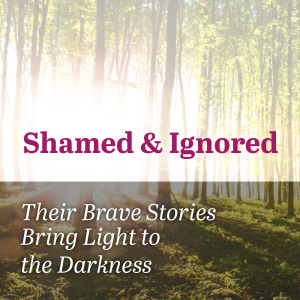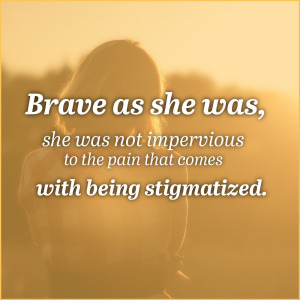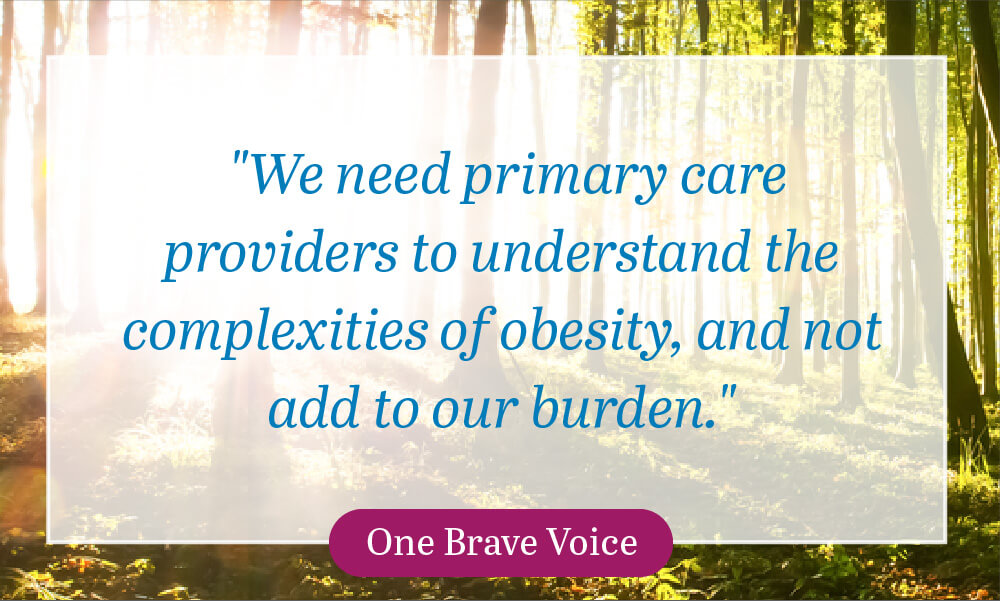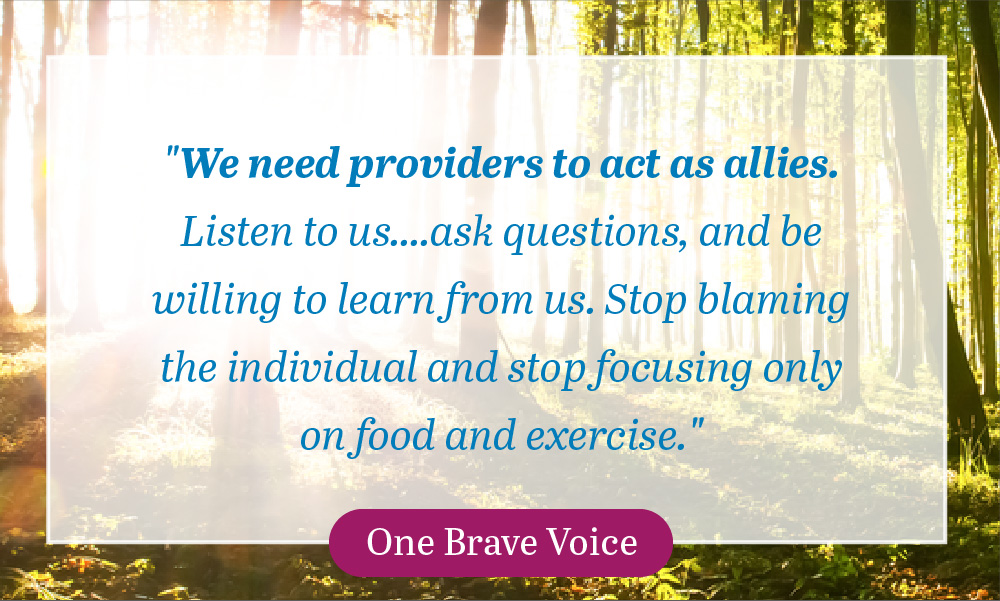Imagine what it would be like to have a medical condition that is  common and treatable, yet every time you see a medical provider you are blamed and shamed for having it.
common and treatable, yet every time you see a medical provider you are blamed and shamed for having it.
On top of that, your condition is cited as the cause for every other health issue you have, even if they are unrelated. At nearly every visit the medical provider brings it up, even if you are there for something else, perhaps something urgent.
Sounds bizarre, doesn’t it? Can this really be happening in our modern healthcare system?
Yes, it’s bizarre. And yes, it’s happening.
It is the stark reality for far too many of the 110 million Americans who have the medical condition called obesity.
The Darkness
 “I was ambushed!” she told me, incredulous and still steaming. “I just barely kept my head up when I left.”
“I was ambushed!” she told me, incredulous and still steaming. “I just barely kept my head up when I left.”
Tears of frustration spilled from her fiery eyes as she told her story.
It started off as an urgent care appointment for a cough. She hadn’t been feeling well for nearly a week. Her cough was getting worse and she had no energy.
“I’ve had bronchitis before and decided that I probably needed an antibiotic. My regular doctor wasn’t available for a same day appointment, so I saw one of the other doctors at the clinic. I’d seen her once before for a similar issue, so it wasn’t our first meeting.”
Barely making eye contact, the doctor entered the room and went straight to her computer monitor.
“You haven’t had a blood sugar test for six months,” she said, without looking up.
“Actually, I have. My weight loss specialist does them every three months and sends my doctor the results. They should be in my file.”
“So she’s providing your diabetic care? We don’t have any record of eye exams or kidney tests.”
“I don’t have diabetes, I am pre-diabetic. My weight loss specialist is monitoring me and sends my regular doctor updates, including labs.”
“You need regular follow-up for your diabetes.”
“I don’t have diabetes! I am pre-diabetic. I am seeing someone every two weeks and I can assure you that I am being monitored.”
“It says here that you are taking metformin. That is a diabetes medication.”
“I take it for pre-diabetes. All this information is in my file.”
On and on it went, until finally, with great fortitude, she was able to shift the conversation to the real reason she was there—she had a terrible cough.
Ten minutes later, she walked out the door, antibiotic prescription in hand. Her final comment to the doctor was uttered silently.
“You don’t know anything about me. I’m just a diabetic fat girl to you!”
Kindling the Flame
I wish I could tell you that stories like this are rare, but they are not. They happen every day and they alienate those who desperately need acceptance and compassion from their healthcare providers, as well as the healthcare they provide.
Fearing judgment and insensitivity, many avoid medical offices altogether or visit them as infrequently as possible. Most are afraid to challenge their healthcare provider’s weight bias.
Given this atmosphere, it is remarkable that my patient refused to be bullied and had the courage to speak up.
But it wasn’t easy.
 Brave as she was, she was not impervious to the pain that comes with being stigmatized. She felt the sting of not being seen or heard for who she is—an informed, health-conscious woman with pre-diabetes, who also happens to be carrying some extra weight.
Brave as she was, she was not impervious to the pain that comes with being stigmatized. She felt the sting of not being seen or heard for who she is—an informed, health-conscious woman with pre-diabetes, who also happens to be carrying some extra weight.
This doctor missed a golden opportunity to partner with her patient. If she had been sensitive to the fear of shame and blame that many obese patients have, she would have set this woman at ease in the first moments of their encounter.
She would have asked questions rather than jump to conclusions. She would have commended her patient for seeing a medical weight loss specialist and making her health a priority. She would have acknowledged her patient’s sophisticated medical understanding—and perhaps learned a thing or two.
She would have engendered her patient’s trust. She would have created a healing partnership—one that would spread beyond that small exam room on that late September day.
But thanks to my patient, light will emanate from the darkness.
After she had finished telling me every last detail, she looked me squarely in the eye and asked me to write about it.
A flame has been kindled in her—one that grows stronger day by day.
She is part of a growing movement of people who are insisting on healthcare that is respectful and healing.
The Flame Grows Stronger
Motivated by an awareness of the weight bias that exists in the healthcare system, the editors of the academic journal Narrative Inquiry in Bioethics started an important conversation.
Nearly a year ago in this blog post, I wrote about this journal’s call for stories from those affected by obesity. Those who were or have been obese were invited to write about discussions they have had with medical professionals about their weight and health.
Several answered the call, including four people who read this blog. I was honored to witness their writing journey. Their stories, along with eight others, were published in the latest issue of the journal.
These blog-readers turned authors were serious about sharing their experiences and raising awareness, particularly among medical providers.
With an unshakable commitment, they poured their stories onto paper. As they did, their thoughts and feelings began to take form and shape.
While they fearlessly explored their experiences, a transformation took place.
Word by word they brought light to the darkness.
Igniting the Flame
Not long ago, my copy of the Narrative Inquiry in Bioethics arrived. As I ran my fingers across the smooth, glossy cover, my eyes unexpectedly filled with tears. To see a topic that is so close to my heart finally receive serious attention moved me beyond words.
Knowing that I helped bring some of the articles to fruition reminded me of the power that we all have to change things that are unsatisfactory, or downright harmful.
As I pored over the powerful stories, I found myself shocked, sad, and angry. Even though I know that weight bias and discrimination exist in healthcare, it is still painful to be confronted with the raw reality.
I also felt a deep gratitude to the authors who bravely shared their stories and brought awareness to this important topic.
In addition to the poignant stories, there are commentaries from a variety of stakeholders, including obesity medicine physician and leader, Robert Kushner, MD.
Each commentator responded to the specific examples and issues that were raised in the symposium articles. Collectively and individually they called for healthcare providers to become informed and sensitive about the complexities of the medical condition called obesity.
Now that the flame has been lit, it’s up to each of us to keep it going.
This journal issue is highly recommended reading for anyone who cares about this topic. I have placed a copy in my waiting room and encourage other healthcare providers to do the same. It is an easy way to educate yourself and others.
To purchase a copy of the journal, send an email to:
Johns Hopkins University Press: jrnlcirc@press.jhu.edu.
Ask for Volume 4, Number 2, Summer 2014.
Lighting the Way
The editors, authors, and commentators of the Narrative Inquiry in Bioethics issue, as well as the patient who insisted that I tell her story, are lighting the way.
I’m proud to say that one of the blog readers has gone so far as to create her own blog: Obesity Game Changer.
Each step, large or small, sheds a little more light into the darkness. Far too many experience what these brave people have shared. Far too many healthcare providers simply don’t understand the scale of the problem.
When patients aren’t getting the care they need, that is a serious problem worthy of attention. And I believe they would want to know.
That is why I continue to speak about the issue.
No matter who you are, what is one small thing that you can do to light the way for yourself or others? I want to hear your stories! Send me a message and let me know if I can share your story to inspire and help others.
Please share this article to spread the word about these very important issues. You can click on the share icons below to share on your favorite social network, or share with an email.




